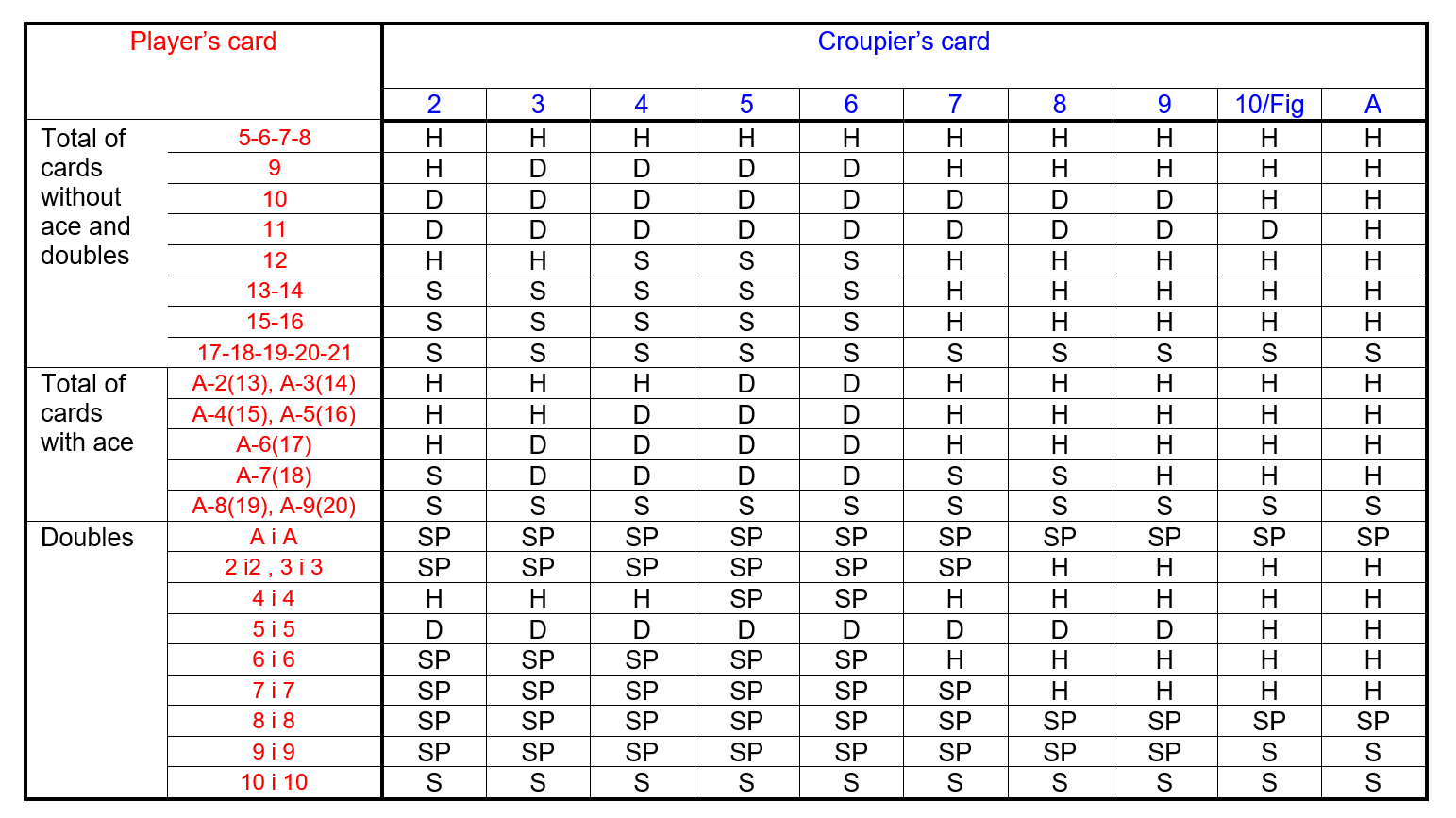Mathematicians and players have always tried to find the way to win at blackjack based on simulations and then computer-assisted analysis. They designed the so-called basic strategy which raises likelihood of winning.
The basic strategy at blackjack was first presented at the turn of 1940s and 50s by John Scarne. This method deviated from what we use nowadays. In 1980s Standford Wong and Peter Griffin modified it to create a modern variant.
The basic strategy helps players take decision in the course of the game and suggests statistically best steps. It is a basis for more advanced blackjack strategies, such as counting cards. The strategy table gives you a tip on how to act with particular cards and croupier’s card. At the meeting point of these two axes is a letter which represents a decision to be taken by the player.
To illustrate:
| Total of your cards | Croupier’s card |
|---|---|
| 6 | |
| 11 | H |
Statistically the best step with your 11 and croupier’s 6 is to HIT, that is to draw another card.
Following the basic strategy, it is important that you differentiate between the so-called hard hand and soft hand. Hard hand is your hand value in which ace is considered as one. Soft hand occurs when ace is counted as eleven. Most casinos allow you to use ace as one or eleven – every time the value of ace may vary, depending on your situation.
See below to find full basic strategy.
Legend:
H (hit) – draw another card
D (double) – double the rate
S (stand) – wait
Sp (split) – split cards
| Player’s card | Croupier’s card | ||||||||||
| 2 | 3 | 4 | 5 | 6 | 7 | 8 | 9 | 10/Fig | A | ||
| Total of cards without ace and doubles | 5-6-7-8 | H | H | H | H | H | H | H | H | H | H |
| 9 | H | D | D | D | D | H | H | H | H | H | |
| 10 | D | D | D | D | D | D | D | D | H | H | |
| 11 | D | D | D | D | D | D | D | D | D | H | |
| 12 | H | H | S | S | S | H | H | H | H | H | |
| 13-14 | S | S | S | S | S | H | H | H | H | H | |
| 15-16 | S | S | S | S | S | H | H | H | H | H | |
| 17-18-19-20-21 | S | S | S | S | S | S | S | S | S | S | |
| Total of cards with ace | A-2(13), A-3(14) | H | H | H | D | D | H | H | H | H | H |
| A-4(15), A-5(16) | H | H | D | D | D | H | H | H | H | H | |
| A-6(17) | H | D | D | D | D | H | H | H | H | H | |
| A-7(18) | S | D | D | D | D | S | S | H | H | H | |
| A-8(19), A-9(20) | S | S | S | S | S | S | S | S | S | S | |
| Doubles | A and A | SP | SP | SP | SP | SP | SP | SP | SP | SP | SP |
| 2 and 2 , 3 and 3 | SP | SP | SP | SP | SP | SP | H | H | H | H | |
| 4 and 4 | H | H | H | SP | SP | H | H | H | H | H | |
| 5 and 5 | D | D | D | D | D | D | D | D | H | H | |
| 6 and 6 | SP | SP | SP | SP | SP | H | H | H | H | H | |
| 7 and 7 | SP | SP | SP | SP | SP | SP | H | H | H | H | |
| 8 and 8 | SP | SP | SP | SP | SP | SP | SP | SP | SP | SP | |
| 9 and 9 | SP | SP | SP | SP | SP | SP | SP | SP | S | S | |
| 10 and 10 | S | S | S | S | S | S | S | S | S | S | |





